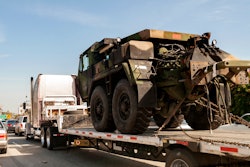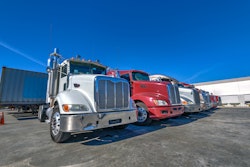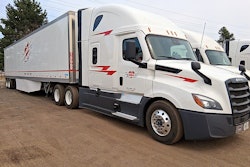“Being a HAZMAT carrier, what basically changed with homeland security was our awareness of security issues while drivers are on route and loading/unloading. Security awareness is now in the forefront of our drivers’ minds. They realize that there are people out there that want to do us harm. Drivers are already having a hard enough time dealing with four wheelers and traffic conditions, but when you add the threat of potential terrorist acts, I’m sure the other guys – van and flatbed haulers – are frightened as well. When you carry the products we do, you have to be pretty vigilant in your pre-trip inspections. Drivers are instructed to look for foreign objects. We had a security advisor come to us through a federal agent and we got some great ideas from him. Management has increased its visibility on the drivers’ safety observations. As far as administration being affected by homeland security, we really have not had to change at all, apart from changes in HAZMAT regulations, such as HM-232, that requires us to have a written security plan. We had security plans anyway, but now they are in written form. Because we haul hazardous waste, we are geared up heavy on security to begin with.”
Jon Harper, executive vice president
Barnett Transportation, Tuscaloosa, Ala.
“The safety and security of personnel, property and equipment have always been paramount to Quality’s operation. The events of September 11 not only heightened our concern about safety measures, they also turned the nation’s attention to security issues. From that day on, the way everyone did his or her job and conducted business was forever changed. Security procedures, at our facilities, our customer locations and during transportation have come under great scrutiny. We have distributed the new federal regulations of security requirements and procedures in compliance with new federal regulations. The key to keeping our company and our country safe from terrorism also rests with every one of our drivers by adhering to the following standards:
- Remain alert and aware of individuals and goings-on around us at all times.
- Wear company photo-ID badge when at any company facility as well as offering it and CDL for proof of identification at customer locations.
- Inspect the facility and equipment often for unidentifiable objects or tampering.
- Be observant of strangers or unusual activities. Should they observe any of these things, they are instructed to report them to the local law-enforcement agency immediately.
The industry we work in and the products we transport create a potential for accident, injury, spill or contamination. Our industry is also a potential target for terrorists. The policies and procedures we operate under and the training the drivers receive are designed to minimize risks and protect them, our customers and the general public.”
Dick Carr, senior vice president of safety
Quality Distribution, Tampa, Fla.
“Actually, depending on which states we go in to, it does affect us. My understanding is that different states have route restrictions. For example, we had a truck headed to Las Vegas recently, and it had to go out of route because the type of trailer we were pulling could not go over the Hoover Dam. If we can’t go over the Hoover Dam, it impacts our business. Of course, in general, because of the nature of the transportation business and the places you go and see, there is an increased awareness in law enforcement. Homeland Security has put everyone on their toes, but I think a lot of it is positive from the standpoint that not as many people are nosing around trailers.”
Tom Sturgeon, transportation manager
Dollar Transportation Inc. Hennessey, Okla.
“None at all. We mostly haul high-dollar boats and yachts. As far as I can see from a safety standpoint, I don’t think it’s ever registered.”
Richard Lee, director of safety
Teton Transportation, Knoxville, Tenn.
“It has had no direct effect on us. We don’t do HAZMAT. All we do is flatbed. We don’t pool trailers or have storage yards either. It really has not affected us a whole lot on our end, but we have a couple of customers who have gotten involved in more security measures which makes it harder to get in and out of their yard. This is the only direct effect we’ve seen.”
James McKinney, president
Davis Transport, Missoula, Mont.
Question: Is engine oil analysis worth the effort?
Respond by e-mail to [email protected] or fax to (205) 248-1046.










